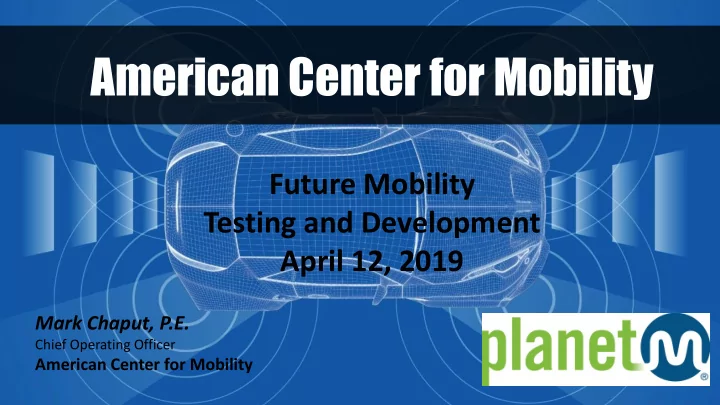

American Center for Mobility Future Mobility Testing and Development April 12, 2019 Mark Chaput, P.E. Chief Operating Officer American Center for Mobility
Barriers to Technology Validation On-Road ✓ “Unlimited” number of possible scenarios to test ✓ System-critical situations rarely happen with normal driving ✓ Scenarios often not reproducible or too dangerous ✓ Millions of miles would be need to be driven to develop the full functionality necessary for validation
3 Product development & validation: Structured combination of three testing methodologies On-road testing & operation Controlled track testing (-) Real-world likeness (+) Virtual Simulation Identify edge cases / evaluate performance & decisions in complex environments Safely validate and control; test interaction; fault injection / limit tests Test, apply fixes, and accumulate “miles;” examine impact of controllable variables
Traditional proving grounds test : Next Generation facilities test : Durability, ride an handling • Sensing, situational awareness • Steering, braking, stability • Variable challenges • Thermal management • Real traffic conflicts • Standard challenges • Decision making • Competitor interoperability •
The American Center for Mobility? Non-profit, Purpose Built, Next Generation Connected and Automated Technology Proving Ground focused on: 1. Product development, testing and validating connected and automated technologies and their security 2. Accelerating voluntary standards, establish path to self-certification 3. Educating and training the workforce, public, and tech sector
What makes ACM Unique? Purpose Built for CAV Testing and Product Development ✓ High Tech State-of-the-Art Proving Ground ✓ Real World Test Environments and Infrastructure ✓ Simulation of authentic Driving Scenarios ✓ Ability to Replicate Environmental Effects Programs Complimentary to Test Activity ✓ Supporting Standards Development with industry ✓ Leading Edge Research ✓ Impacting the Workforce of the Future ✓ Expanding the Facility Footprint and Services
Future mobility testing and development
No ‘easy’ miles Real world complexity • Bl Blind crests, curves, corners • Blocked GPS • Gores • Potholes • Trees/leaves • Worn and faded lines 10
ITS /Comm Network 19
Test equipment AB Dynamics GST – Guided Soft Target carrying a Soft Car 360 vehicle target; AB Dynamics SR60 Torus – AB Dynamics CBAR600 – Combined Brake and Accelerator Steering Robot Robot
Creating weather simulation Rain and Fog simulation Snow and sleet simulation Weather Chamber On site engineering On site fabrication Expanding Testing Support Services
Dynamic Rain Simulation in a Structured Physical Environment 10’ max header ( tunnel limited ) Host #1 Water Tank (1100 gal) Trailer 20’ x 9’ Top View Side View
Dynamic Rain Simulation in a Structured Physical Environment Trailer 20’ x 9’ Water Target Tank Host #2 Top View Rear View
AV Validation – Policy & Standards Unanswered questions: • How safe is safe enough? • When is a test vehicle safe enough to go out on the public roads? • How will we validate that an AV is ready for public sale and use? • How are in-service updates, repairs, and aftermarket solutions validated? Timelines: • Regulation: US DOT/NHTSA (10 years) • Standards: SAE (2-3 years) • Shared methods: ACM (6-12 months?)
ADS Demonstration U.S. DOT: Federal Highway Administration Project: Automated Driving System Demonstration Grants NOFO: 693JJ319NF00001 Funding: $60M, $10M max/project, $15M max/state, 1-4 years Proposal stage Team: Michigan Mobility Collaborative PI: City of Detroit Partners: American Center for Mobility Mcity & UMTRI, University of Michigan Wayne State University Ford Smart Mobility, LLC Deloitte LLP MEDC MDOT Goals: Safety, Data for Safety Analysis and Rulemaking, Collaboration Focus: Significant Public Benefit(s) Addressing Market Failure and Other Compelling Public Needs Complexity of Technology – SAE Level 3+ Diversity of Projects Transportation-challenged Populations Prototypes
Automated Street Sweeper Research Grantor: Federal Republic of Germany Brokers: Transatlantic Automated Driving Alliance AMZ Saxony & Ann Arbor SPARK Project: Automated Street Sweeper (proposal) Funding: €1.1M over 3 years, 50% match PI: AMZ Saxony (proj. mgmt.) Partners: ACM (test & validation) Dekra (test & validation) FAUN (spec, sweeping sys) FusionSystems (sensors, auto-drive, controller, mapping, intelligence) Mcity (tbd) New Eagle (actuation) Trillium Secure (cybersecurity) Goals: Improve ‘Dull, Dirty, Difficult, Dangerous’ Focus: Performance, time, energy efficiency
ACM Academic Consortium
Mark A. Chaput American Center for Mobility PLANET M Website www.planetm.com
Recommend
More recommend